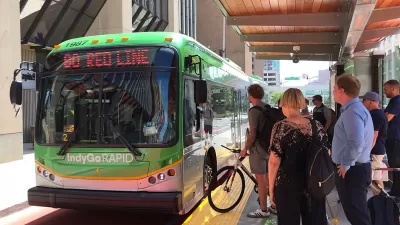Waiting for the funding to back up a transit plan can be brutal—especially when the calendar says February you thought you approved a transit-funding tax in the November election.

Voters and advocates in Indianapolis are learning that their vote to approve Question 2, a referendum to approve a transit-funding income tax, had a catch: it didn't actually approve a new law.
Despite earning 59.26 percent of the vote, writes Amber Stearns, "the ballot question in November was simply a way to gauge public support — to see if people would see a value in supporting mass transit in the form of a small income tax."
Now the task of passing the transit tax into law is up to the Indianapolis City Council, "and among the 25 city-county councilors there are a lot of mixed feelings about this proposal," reports Stearns.
At risk is a constant stream of revenue for IndyGo, and a transit plan that "includes a re-work of bus routes and frequency, a streamlined 7-day schedule for greater reliability and three rapid transit lines," writes Stearns. Planetizen Correspondent Irvin Dawid reported in detail on the unique structure of the income tax, and the political support that earned Question 2's approval, in an article from November.
The article by Stearns also offers an in-depth exploration of the politics at play as the tax heads to an expected vote in the City Council on February 27.
FULL STORY: City-County Council finds a difficult path to funding mass transit in Indy

Trump Administration Could Effectively End Housing Voucher Program
Federal officials are eyeing major cuts to the Section 8 program that helps millions of low-income households pay rent.

Planetizen Federal Action Tracker
A weekly monitor of how Trump’s orders and actions are impacting planners and planning in America.

Ken Jennings Launches Transit Web Series
The Jeopardy champ wants you to ride public transit.

Philadelphia Is Expanding its Network of Roundabouts
Roundabouts are widely shown to decrease traffic speed, reduce congestion, and improve efficiency.

Why Bike Lanes Are Good: An Explainer for the US Transportation Secretary
Sean Duffy says there’s no evidence that bike lanes have benefits. Streetsblog — and federal agencies’ own data — beg to differ.

California Invests Additional $5M in Electric School Buses
The state wants to electrify all of its school bus fleets by 2035.
Urban Design for Planners 1: Software Tools
This six-course series explores essential urban design concepts using open source software and equips planners with the tools they need to participate fully in the urban design process.
Planning for Universal Design
Learn the tools for implementing Universal Design in planning regulations.
Ada County Highway District
Clanton & Associates, Inc.
Jessamine County Fiscal Court
Institute for Housing and Urban Development Studies (IHS)
City of Grandview
Harvard GSD Executive Education
Toledo-Lucas County Plan Commissions
Salt Lake City
NYU Wagner Graduate School of Public Service



























